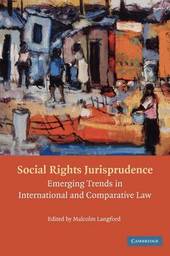
|
Social Rights Jurisprudence: Emerging Trends in International and Comparative Law
Hardback
Main Details
| Title |
Social Rights Jurisprudence: Emerging Trends in International and Comparative Law
|
| Authors and Contributors |
Edited by Malcolm Langford
|
| Physical Properties |
| Format:Hardback | | Pages:704 | | Dimensions(mm): Height 254,Width 178 |
|
| ISBN/Barcode |
9780521860949
|
| Classifications | Dewey:341.48 |
|---|
| Audience | | Professional & Vocational | |
|---|
|
Publishing Details |
| Publisher |
Cambridge University Press
|
| Imprint |
Cambridge University Press
|
| Publication Date |
19 January 2009 |
| Publication Country |
United Kingdom
|
Description
In the space of two decades, social rights have emerged from the shadows and margins of human rights jurisprudence. The authors in this book provide a critical analysis of almost two thousand judgments and decisions from twenty-nine national and international jurisdictions. The breadth of the decisions is vast, from the resettlement of evictees to the regulation of private medical plans to the development of state programs to address poverty and illiteracy. The jurisprudence not only implicates our understanding of economic, social, and cultural rights, but also challenges the philosophical debates that question whether these rights can and should be justiciable.
Author Biography
Malcolm Langford is Research Fellow and Director of the Human Rights and Development Research Group at the Norwegian Centre on Human Rights at the University of Oslo. With numerous articles and books on human rights, economics, and law, he is a recognized expert in the field of economic, social, and cultural rights. He advises a wide range of UN agencies on human rights and development issues and has drafted a number of key international standards. He previously worked at the Geneva-based Centre on Housing Rights and Eviction (COHRE), where he founded an international litigation program.
Reviews"This book provides eloquent testimony to the fact that the debate about the justiciability of social rights has come of age." --Philip Alston, Professor of Law at the New York University School of Law
|